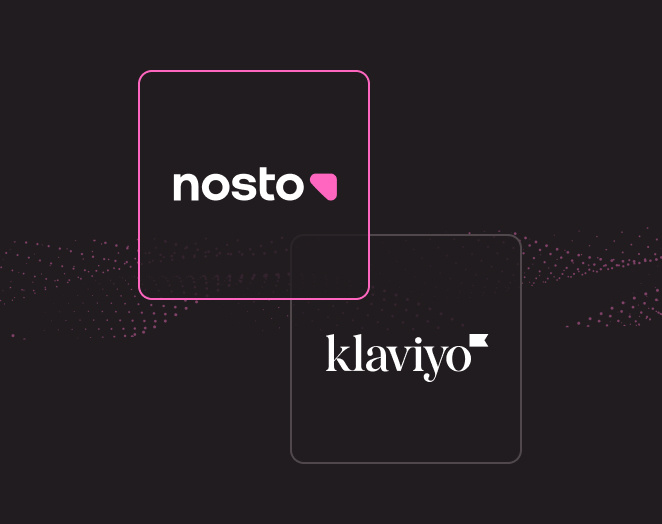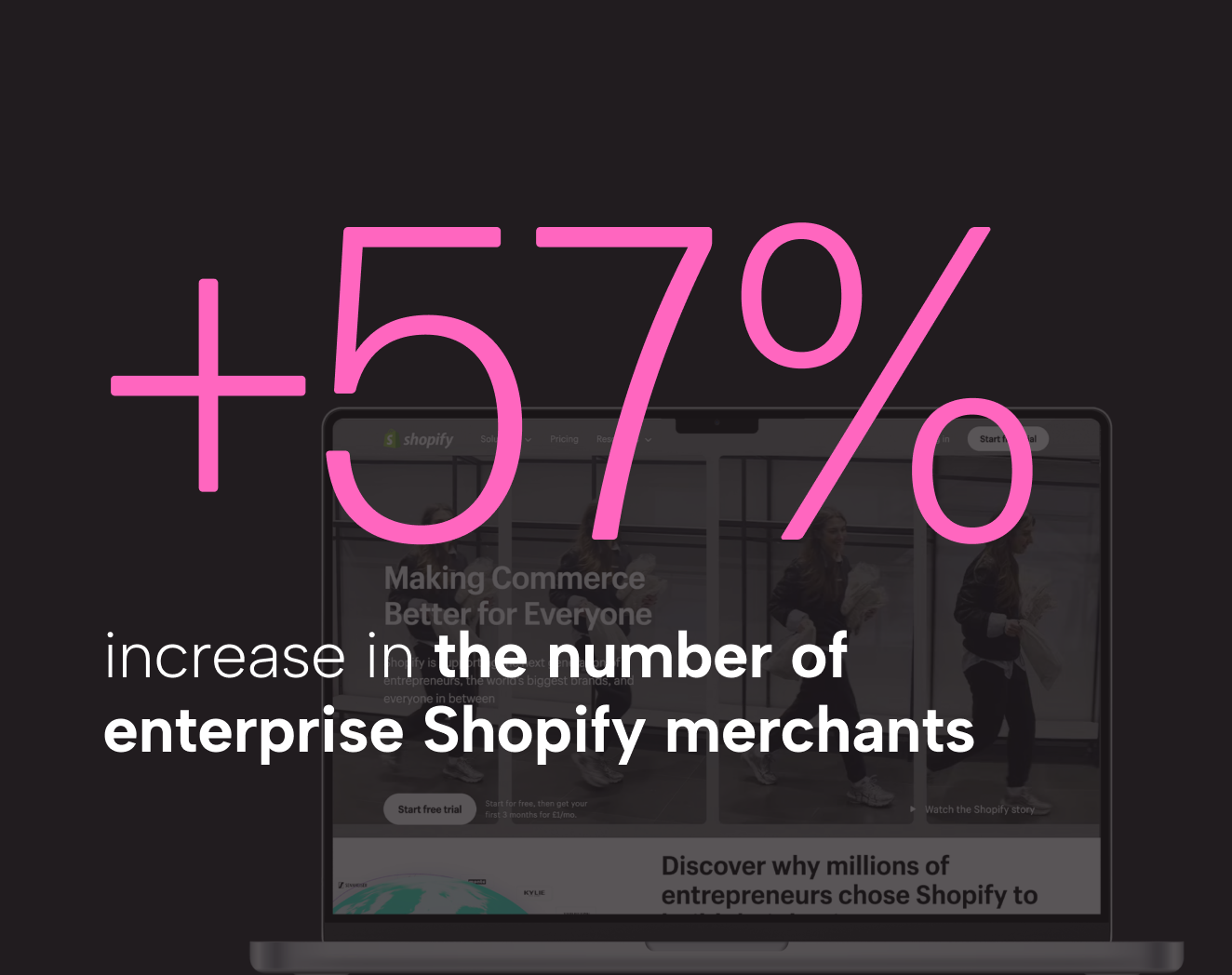Ecommerce Machine Learning Explained
Nothing goes together better than eCommerce and new technologies – it’s like peanut butter and jelly on your morning toast. In fact, if not for technological development, we wouldn’t have eCommerce as a thing at all. And probably the most breakthrough technology for eCommerce is the one based on machine learning (ML) and artificial intelligence (AI).
To simplify, AI is the capacity of a computer to imitate the logic of a human being, and ML is a subset of it. Basically, machine learning is a computer’s ability to discover how it can automatically perform tasks without being “told” to do so. Fundamentally, ML helps AI find out how to deal with a data set. However, for the aim of this article, these two terms can be used correspondingly.
ML and AI benefits for eCommerce are beyond amazing. The reality is that it can compute data and make forecasts so much faster than a whole team of human beings! It ranges from more accurate insights & predictions to better customer service and retargeting, all of which contribute to significant revenue growth.
Keep on reading to learn what machine learning and artificial intelligence are, how eCommerce benefits from them, and the most popular use cases for ML and AI in the industry.
Table Of Contents:
- Machine Learning vs. Traditional Programming
- Machine Learning vs. Artificial Intelligence
- Advantages Of Ecommerce Machine Learning Technologies
- Machine Learning Ecommerce Best Practices
- Final Thoughts On Ecommerce Machine Learning Technologies
Machine Learning vs. Traditional Programming
Bill Gates once said:
“If programming is automation, then machine learning is automating the process of automation”.
Which broadly speaking sums up what ML is.
In the traditional programming case, we want to get rid of repetitive manual tasks, so we write a set of instructions (program) that computers can understand to automate these tasks. To get the desired output, we take this program, and we feed it to the machine, along with the data.
And on the other side there is Machine Learning, which allows us to do things quite the opposite. In this case, to get a program, we feed the data and the desired output to the computer. Basically, we do not need to manually create rules, as ML algorithms can conclude the appropriate set of rules from the “training” data. It provides us with the program (model) that we can then apply to the new data to solve related tasks. By using algorithms, it can provide systems with the capacity to learn and optimize processes through experience automatically.
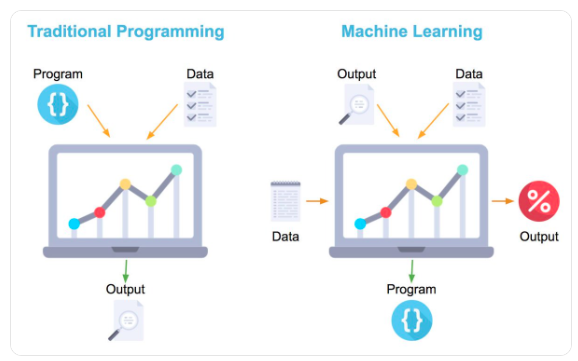
ML can produce quicker, more reliable results and quickly and efficiently achieve predefined end goals when fed with the correct intent, data, application rules, and limits.
Machine Learning vs. Artificial Intelligence
Machine learning and artificial intelligence are often used interchangeably, even though ML is only a subset of AI, as was mentioned in the introduction.
AI’s fundamental goal is to develop intelligent machines, which could automatically do tasks typically requiring a human being. For instance, planning, analyzing, learning from examples, understanding different languages and abstract ideas, and eventually generalizing the concepts that have been discovered. In real life, we can see artificial intelligence performing such tasks as predicting consumer behavior or image recognition.
Lets go a bit deeper on how the model looks. ML is a subset of AI, and has its own subset – natural language processing (NLP). All three of these areas are extremely important for modern eCommerce businesses. ML helps solve various problems without human interaction by using examples and learning from experience. NLP helps computers to understand humans in their natural language.
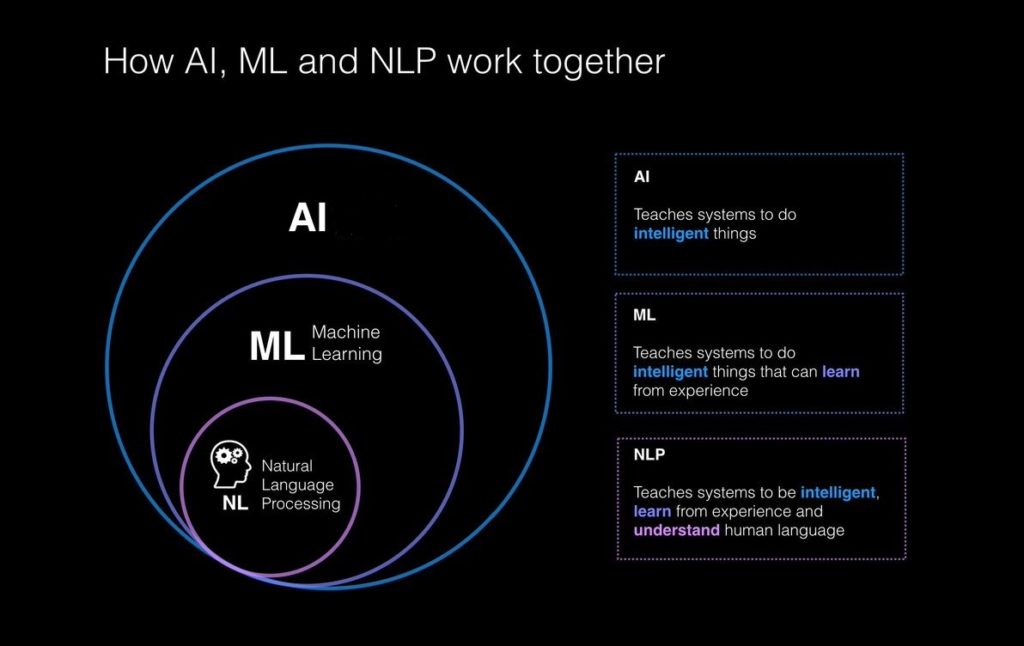
Artificial intelligence, especially machine learning, allows us to do manual activities very quickly. And it does its job exceptionally well, which is why eCommerce leaders can work more on a strategic business level rather than focus on repetitive tasks.
Advantages Of Machine Learning Ecommerce
The main benefit of machine learning is the automation of tasks, but it’s not the specific solution, so let’s dig a bit deeper into it. The main thing here is that eCommerce businesses have loads and loads of data. ML and AI need that data to be able to work. So it’s like a perfect match!
Indeed, eCommerce was one of the first industries that started reaping ML benefits. Think about such companies as Asos or Zalando, which has entire teams dedicated to AI. They throw a lot of money into it. Apparently, it pays off: these companies are well-known eCommerce brands, rocking at personalized offers and customer experience, which is in huge part because of machine learning and artificial intelligence. Not to mention that they have well-optimized processes, as ML allows automate tasks that otherwise would need to be done manually.
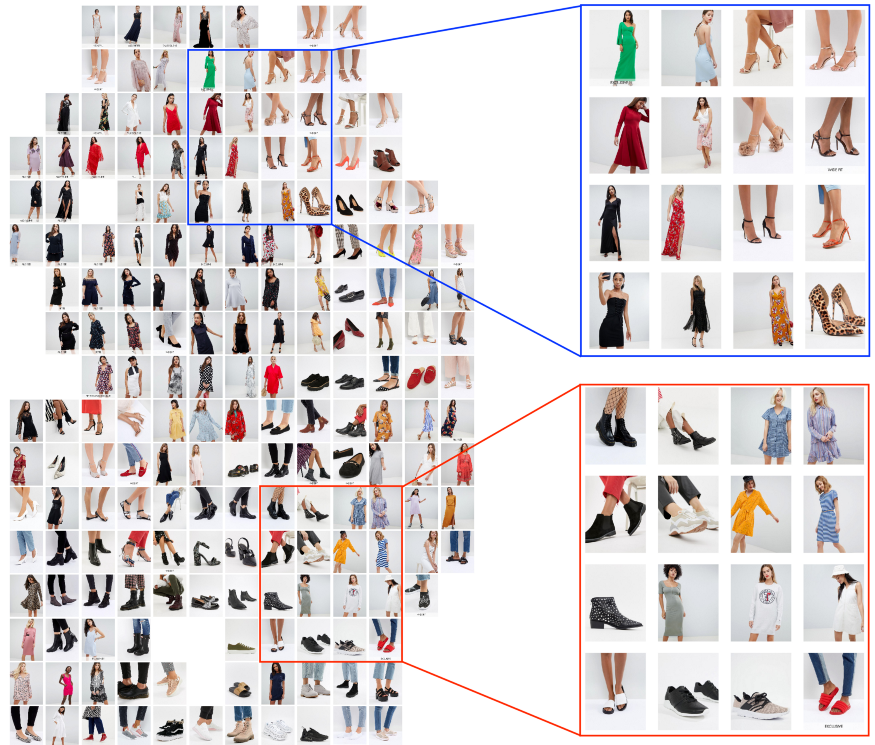
an area containing occasion wear while the red box contains casual day wear.
However, as attractive as it may sound, making the use of eCommerce data is rather challenging. For example, suppose you want to detect a pattern in site search trends. In that case, you need to combine many dynamic, ever-changing rules, which is quite tricky and resource-intensive to maintain manually. Well, it’s possible to create and manipulate these rules, but it’s not scalable, and this is where machine learning comes to help.
In the next chapter, we discuss the specific areas where AI and ML can help eCommerce and best practices for it.
Machine Learning Ecommerce Best Practices
In the eCommerce Trends 2021 Survey Report, we asked eCommerce leaders where they think AI would be the most helpful for the industry in the following year:
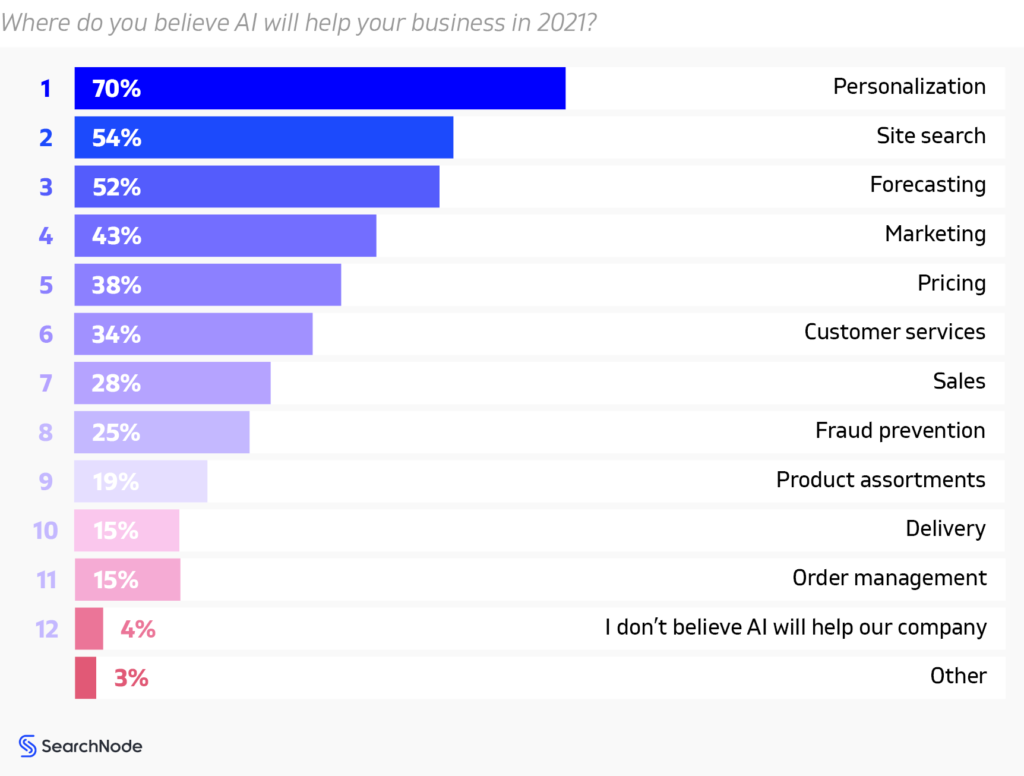
The respondents recognized personalization (70%), site search (54%), forecasting (52%), marketing (43%), pricing (38%), customer services (34%), sales (28%), and fraud prevention (25%) as the areas most likely to receive AI assistance in 2021. Other options received less than 20% of participant votes. Thus, we took these 8 most attractive areas for eCommerce leaders, to tell you more about how machine learning can help them individually.
1. Personalization
Personalization was the most popular answer in the eCommerce leaders survey about where AI will mostly help their businesses, and that’s not a surprise. Some claim that personalization was the first area that received AI assistance in eCommerce, so it’s been here the longest, and it’s continually improving, bringing more and more results for businesses. And customers seem to like it – according to a report by Accenture, 75% of shoppers will be more willing to make a purchase if an eCommerce store can recognize their name, recommend products, and know their buying history.
Personalization technologies based on artificial intelligence and machine learning help businesses offer better shopping experiences, leading to higher sales, by analyzing behavioral data. It provides customers with a smooth discovery process, using real-time product targeting, personalizing discounts, offers, and crafting individualized recommendations.

The product recommendation technology combines two types of approaches: historical and predictive. The first one uses historical data to feed algorithms with information of what products should be suggested for individual shoppers, based on their previous behavior and purchases. The second one uses the data to anticipate what could be the next purchase of the user.
2. Site Search
Ecommerce site search used to be all about matching keywords and listing products, and not thinking much about the searcher’s intent, query context, or even relevance (!). Not to mention lots of other factors, such as product stock, profit margin, discounts, searchers location, browsing history, and so on.
Nowadays, it’s not enough to simply match keywords with products. Let’s say a user is searching for a face mask. There are plenty of face masks available: cosmetic ones, welding ones, medical ones, etc. All of them have different prices, delivery time, profit margin, and so forth. Which ones should show up on top of the SERP? And “face mask” is just one query among millions of others…
The features and capabilities of AI-based site search range from simple ones, like natural-language-processing, or intelligent search assistant, to much more advanced ones, such as personalized search results, based on browsing history, or automated search merchandising, providing results based on seasonality.
Surprisingly, many eCommerce companies today buy tools, which often “pretend “to have AI, while in reality, people still need to manipulate search results manually query-by-query! Imagine an online shop with hundreds of thousands of products and millions of search queries. In such a case, you’ll need many people manually setting up rules, not to mention that these kinds of activities create other problems like search debts. Thus, this is not a scalable solution.
As we provide such solutions, let’s take a closer look at the real-life example. When COVID-19 started spreading, users began actively looking for “masks” on our client Pigu Group online store. This client sells various consumer goods, and thus before the pandemic hit, people were usually looking for cosmetics masks or masks for sports. As the company has our custom-made automated algorithms implemented, then searches for “masks’ spiked, SearchNode quickly recognized that searchers intent behind “masks” is for medical ones rather than cosmetic or sporting ones. So the algorithms automatically adjusted SERP without human interaction.

Let’s take another case from our client Castorama’s success story. One of the key challenges they had before implementing our solutions was irrelevant search results, mainly because of poor polish NLP. For instance, when users searched “table for children” (stolik dla dzieci), they found mosquito repellent for children (Płyn na komary dla dzieci), because those products were named under the same category, as they have related keyphrases. Now, with a tailor-made SearchNode solution enriched with artificial intelligence, the search can recognize children’s’ tables in any written form.

Another exciting site search related ML and AI technology is voice and image search. Image recognition technologies allow customers to search by using images instead of text or narrow down their searches using visual filters. Voice recognition technology is also gaining momentum, especially with the fast development of voice-based assistants, such as Amazon Alexa or Apple Homepod.
A genuinely intelligent eCommerce search exploits AI and machine learning algorithms to automate the time-intensive work usually done by eCommerce developers, marketers, and merchandisers. Moreover, it can self-learn and optimize performance on the go.
3. Forecasting
People used to go to fortune tellers to learn about what the future may hold for them, but now we have a prophet of new ages – AI. Who wouldn’t like to see the future when it comes to business decisions? AI and ML can access and work with tons of data sources – from sales data to market research or social media. This allows artificial intelligence to create forecasts that are far from guessing.
By working on this data AI, with the help of machine learning, is able to predict behavior, create detailed customer profiles, catch rising trends, and so on. Bellow, we stated a few questions of what artificial intelligence can answer for eCommerce businesses:
- What is a customer lifetime value?
- When is the customer likely to churn?
- Will a user purchase in a specific product category (real-time)?
- Will a user return?
- When the user returns, what is he/she most likely to buy?
- What does demand look like?
A fascinating but rather amusing example here is Target Corp., which hired ML experts to analyze shoppers’ data and predict pregnancy. They used this to create targeted personalized marketing campaigns, such as coupons for baby goods. However, this ended badly, as there was a case reported, where a teenage girl started receiving these targeted promotions, and her father learned about her pregnancy from ads. Thus, Target later decided to change this strategy, as customers reported that they do not feel comfortable with this kind of personalization.

These are only a few examples of how machine learning can help eCommerce companies to make better decisions. But it’s no doubt that all this information is precious and allows companies to optimize their resources and increase profit margins. Just as in Target case, companies should be careful about this.
4. Marketing
Marketing technologies based on artificial intelligence and machine learning for eCommerce are positively related to the capabilities we described in the personalization part. ML lets eCommerce marketers evaluate big data sets about their customers and provide customized messages based on their habits, orders, and interests.
All this data serves exceptionally well in marketing, as it can help to craft the best offers for the client automatically. By offers, we mean various strategies: from personalized landing pages and emails to retargeting ads on the web. The more the program learns about unique visitors, the better it can predict what that shopper is most likely to buy, at what price, and what ad should trigger him or her to buy.
Machine learning technologies for eCommerce help marketers to understand their customers’ mindset better.
But not just that. There are plenty of advertising platforms, which can help retailers create personalized, intelligent ad campaigns, and with a single click, distribute them across different channels. These ML-based technologies will make sure to choose the best delivery method at the right bids.
Machine learning technologies for eCommerce marketers can help them understand their customers’ mindset and optimize their marketing activities in the most efficient way, which will guarantee sales growth.
5. Pricing
Pricing is another eCommerce sphere where machine learning makes a huge difference for modern companies. To be more specific, we will cover dynamic pricing here.
Dynamic pricing is a price-setting method, allowing online retailers to automatically change their products’ prices based on demand and supply relationships in real-time. It uses lots of data points, such as competitors’ prices, customer behavior, sales, and other essential data. By leveraging this data, the computer can determine what and when should be discounted and make calculations of the minimum discount level so that a transaction is guaranteed to happen.
Here a good example is Amazon. According to Business Insider, Amazon managed to boost its profits by 25% using a dynamic pricing strategy. How do they manage to do this? Well, they have TONS of data; we mean, they have billions of items being sold by millions of sellers. All this data is being continuously analyzed, and changes to prices happen every 10 minutes. These changes sum up to a brilliant 2.5 million times per day! This is precisely why Amazon can always offer the best competing price.

So clearly, the potential results of dynamic pricing are massive. By using this technology, eCommerce businesses can deliver the best price offer for their customers at the right moment to maximize the probability of purchase.
6. Customer Services
Customer services can be a headache. The processes are hard to create and maintain, not to mention that its’ costly to have departments of support agents. AI helps lower the burden of customer inquiries, automate the process, and deliver round-the-clock customer service without human intervention.
The most popular customer service tools based on AI and ML in eCommerce are chatbots. By making personalized suggestions, it can help to solve customers’ problems efficiently. Chatbots are part of conversational commerce technology. By using NLP and machine learning helps customers solve their problems in the form of a conversation. In no time, it can address customer questions through various channels.
Moreover, connected with home automation virtual personal shopping assistants, it actually helps people to buy the goods they are looking for. It guides customers to make their purchases rather than browsing the store yourself. It is powered by artificial intelligence to help consumers find the things they are searching for quickly.
For example, North Face started using ML and AI to offer their clients virtual assistant “Shop with IBM Watson. Using an app, the users can use their voice to speak with Watson. The virtual assistant guides a shopper, using various questions, and offers the most relevant products, based on their answers. This way, North Face is able to imitate human experience, without an actual human.

The benefits of AI chatbots range from good customer service to smother return processes or improved discovery. All in all, this is a great way for eCommerce companies to optimize their day-to-day operations.
7. Sales
Anyone who tried to create a customer relationship management process knows how agonizing it can get. Long gone are the days when it meant recording entries in spreadsheets, analyzing vast amounts of data yourself, and crafting reports from all of that. This is also where AI and machine learning come in hand for eCommerce people.
The CRM capabilities of AI streamline the entire data analytics and demand forecasting process. AI-powered CRM software captures, absorbs, analyzes, and organizes information to scrutinize visitor buying patterns, identify productive buyer personas, anticipate buyer trends, and optimize conversion rates.
A great example here is Einstein by SalesForce. It is a tool based on AI and ML, which is able to prioritize leads, that are more likely to buy, and add this data you your CRM automatically. Moreover, it can analyne shoppers behaviour on social media, and provide personalization.
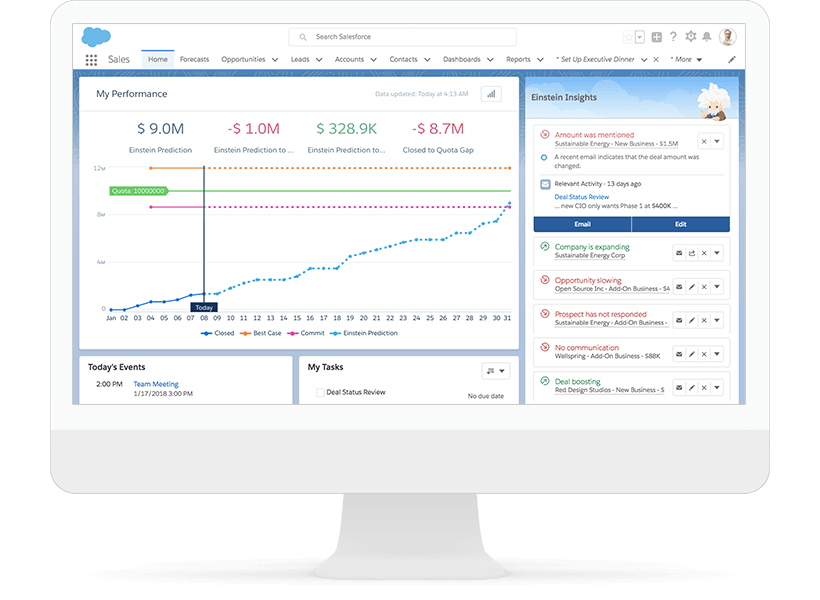
8. Fraud Prevention
When fraud is happening, it usually reflects as an anomaly in the data. Bearing in mind that machine learning is all about the data, it works very well in preventing fraudulent actions from happening in eCommerce stores. And this is something that each retailer should think about – security concerns are one of the top reasons for abandoned carts.
“Security concerns are one of the top reasons for abandoned carts.”
ML became an irreplaceable solution in dealing with such fraudulent actions as customers that use their credit card companies to cancel payments after receiving the products, transactions from stolen credit cards, or promo codes abuse. It is able to identify unusual patterns of behavior and notify the company. Moreover, AI machines keep learning, so they become smarter and are even able to detect fraudulent activities before they even happen.
All this allows companies to build more trust and credibility, avoid unpleasant situations, and save money.
Final Thoughts On Ecommerce Machine Learning Technologies
One more thing we would like to stress out about eCommerce machine learning is this:
Artificial intelligence and machine learning tech


